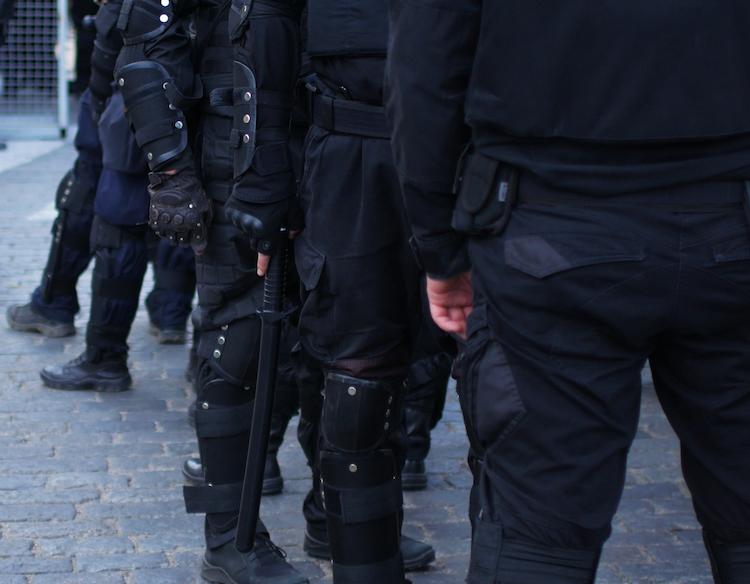SCOTUS to Decide If Family Can Sue Over SWAT Raid

The U.S. Supreme Court recently granted certiorari in Martin v. United States. The case is expected to clarify the application of the Federal Tort Claims Act (FTCA) to wrong-house raids, an issue that has divided the lower courts.
Facts of the Case
In October 2017, agents of the Federal Bureau of Investigation (FBI) executed a no-knock search warrant at the house Curtrina Martin, her minor child, G.W., and Hilliard Toi Cliatt (collectively, “Petitioners”). It was not the address identified in the warrant. The target address — which was reportedly the home of Jospeh Riley, a violent gang member — was located approximately a block away from the Petitioners’ house and shared similar conspicuous features with their house.
Petitioners initiated an action against FBI special agent, Lawrence Guerra, and six unnamed agents pursuant to Bivens v. Six Unknown Named Agents of Federal Bureau of Narcotics, 403 U.S. 388 (1971) and the United States under the FTCA, alleging that the FBI agents violated their Fourth Amendment rights and were also liable for damages under Georgia tort law.
Qualified immunity protects government actors performing discretionary functions from civil liability. Government officials are entitled to qualified immunity unless their conduct violates “clearly established statutory or constitutional rights of which a reasonable person would have known.”
Meanwhile, the FTCA waives the federal government’s sovereign immunity for the wrongful or negligent acts or omissions of its employees if a private person, under the same circumstances, would be liable under the law of the state where the alleged act or omission occurred. However, the FTCA exempts from liability state-tort claims arising from a government official’s performance of a duty or function that involves discretion.
Eleventh Circuit’s Decision
The district court dismissed the claims, and the Eleventh Circuit Court of Appeals affirmed. It held the decisions that Guerra made-albeit mistaken-in the rapidly changing and dangerous situation of executing a high-risk warrant at night constitute the kind of reasonable mistakes that the Fourth Amendment contemplates. It further held that all of Petitioners’ FTCA claims are barred by sovereign immunity supplied either through the Constitution’s Supremacy Clause or the FTCA’s discretionary-function exception.
Questions Before the Court
The Supreme Court granted certiorari on January 27, 2025. The justices have agreed to consider the following questions:
1) Whether the Constitution’s Supremacy Clause bars claims under the Federal Tort Claims Act when the negligent or wrongful acts of federal employees have some nexus with furthering federal policy and can reasonably be characterized as complying with the full range of federal law.
2) Whether the discretionary-function exception is categorically inapplicable to claims arising under the law enforcement proviso to the intentional torts exception.
Oral arguments have not yet been scheduled. However, the Court should issue a decision by the end of the term in June/July.
Previous Articles
Supreme Court to Address Racial Discrimination in Jury Selection
by DONALD SCARINCI on January 29, 2026While the U.S. Supreme Court has concluded oral arguments for the year, it continues to add cases t...
Supreme Court Halts Deployment of National Guard to Chicago
by DONALD SCARINCI on
In Trump v. Illinois, 607 U.S. ____ (2025), the U.S. Supreme Court refused to stay a district court...
SCOTUS Agrees to Consider Merits of Birthright Citizenship Case
by DONALD SCARINCI on
On December 5, 2025, the U.S. Supreme Court agreed to review the constitutionality of one of Presid...
The Amendments
-
Amendment1
- Establishment ClauseFree Exercise Clause
- Freedom of Speech
- Freedoms of Press
- Freedom of Assembly, and Petitition
-
Amendment2
- The Right to Bear Arms
-
Amendment4
- Unreasonable Searches and Seizures
-
Amendment5
- Due Process
- Eminent Domain
- Rights of Criminal Defendants
Preamble to the Bill of Rights
Congress of the United States begun and held at the City of New-York, on Wednesday the fourth of March, one thousand seven hundred and eighty nine.
THE Conventions of a number of the States, having at the time of their adopting the Constitution, expressed a desire, in order to prevent misconstruction or abuse of its powers, that further declaratory and restrictive clauses should be added: And as extending the ground of public confidence in the Government, will best ensure the beneficent ends of its institution.





